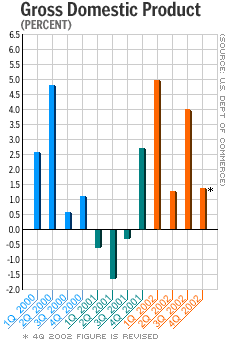NEW YORK (CNN/Money) - By most accounts the U.S. coalition's war against Iraq is going well. Troops have advanced quickly, casualties have been low and the threat to the country's oil fields has been pretty much removed.
But there is no denying that the early enthusiasm that the war would be over quickly has been quenched. At its outset a week ago, expectations that Saddam Hussein's regime would fold within weeks ran high, fueling a massive rally in the stock market. This was not a notion just spun by the gee-whiz media and euphoric stock traders. Members of the Bush administration had talked about how they expected Iraq's regular army to put up little fight, and how the Iraqi people would greet the coalition forces as "liberators."
"Nothing seems to be going quite right," said Paul Kasriel, chief U.S. economist at Northern Trust. "We're not seeing mass defections. The weather has been bad. Frustrations are starting to build that this might be going into a less antiseptic phase."

This doesn't mean that the war will necessarily be anything other than short by historic standards -- recall that the super-quick first Gulf War lasted 74 days. But some Wall Streeters are beginning to wonder what will happen to the weakened U.S. economy if the war lasts months rather than weeks.
The original fast and light plan appears to have been revised, with coalition forces now concentrating on beating back resistance within southern Iraq before marching on to Baghdad. In a sign that the speed of the fight may be lagging behind the administration's expectations, Dow Jones reported Wednesday that President Bush had hastily changed a speech he gave in Florida, omitting a portion where he planned to say that coalition forces were ahead of schedule.
"The whole view that this was going to be over quickly and it would be off to the races was just pie in the sky," said Merrill Lynch chief North American economist David Rosenberg. "My sense is that this could easily drag on for months. At what point does that hit people like a two-by-four?"
The economic context of the conflict is sobering. Beginning late January, as military action against Iraq looked increasingly likely, businesses and consumers pulled back. February was a lousy month, with a swath of economic indicators coming in worse than originally expected. March, too, looks fairly abysmal. Many economists, from the Federal Reserve on down, have held that, once the war is over, the fog of uncertainty will lift, paving the path to economic recovery.
But if the fog doesn't lift in fairly short order, talk of when real economic recovery begins will have to wait. The economy's current pace, if it slackens and does not improve, could mean a slide back into recession.
"We're not going to be in a recession if the economy reverses quickly," said Lehman Brothers chief economist Ethan Harris. "But if the war keeps going on, recession is a major risk."
Harris' sense that the economy will skirt recession rests on his sense that the war will be over within a month. But because, with all the propaganda flying, it's hard to put any kind of estimate on the length of the war, Harris has puts the risk of recession much higher than normal, and he thinks the economy will only grow at an annualized rate of 1 percent in the first six months of this year.
Investors remain unprepared for anything but a short war, said Morgan Stanley economist Bill Sullivan, and it is doubtful that they have even begun to factor in the possibility that a longer war could mean not just another deferral of sustained economic growth, but outright contraction.
"If conflict extends for several months, that is a completely different dynamic than investors are assuming," said Morgan Stanley economist Bill Sullivan. "One could not rule out global equity markets hitting new lows."

|

